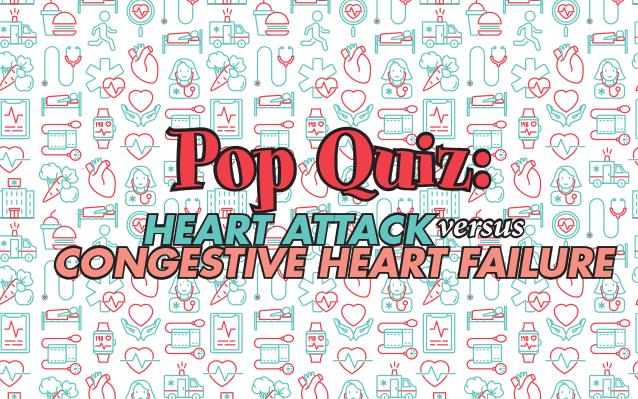Test Your Knowledge and Know the Difference between CHF and a Heart Attack
by ERIKA ALDRICH
Heart Disease is the leading cause of death in the United States, causing approximately one out of every four deaths. Since prevention is key, it’s important to know as much as possible about heart disease. There are many different illnesses and conditions that make up heart disease, and though they are sometimes spoken of as being one and the same, each malady has its own definition and symptoms. For instance, do you know the difference between a heart attack and congestive heart failure? Take our quiz below to
test your knowledge and learn about these two conditions— and how to avoid them!
[toggles title=”True or False? Congestive heart failure can lead to a heart attack.”]False. A heart attack can lead to congestive heart failure.[/toggles][toggles title=”Which of the following is the physiological cause of a heart attack?
A. When the heart muscle beats irregularly
B. When the buildup of fatty deposits (plaque) in your arteries blocks blood flow to the heart, depriving it of oxygen and the muscle begins to die
C. When the body’s blood “attacks” the heart
D. When impurities in the blood poison the heart.
“]B. A heart attack is caused by a blockage.[/toggles]
[toggles title=”
Which of the following is the physiological cause of congestive heart failure?
A. Failure to properly pump out blood to the body (left-sided heart failure)
B. Back-ups in the area of the heart that collects “used” blood (right-sided heart failure)
C. Fluid backs up into the lungs
D. All of the above
E. None of the above
“]D. All of the Above. A, B, and C are all causes of heart failure.[/toggles]
[toggles title=”True or False? Congestive heart failure means your heart has stopped working.”]False. Congestive heart failure means that the heart isn’t able to pump enough blood to meet the needs of the body.[/toggles]
[toggles title=”
Fill-in-the-blank: Most heart attacks happen __________ when one of the arteries leading to the heart becomes blocked and cuts off the blood flow; Heart failure, however, usually develops __________.
A. Suddenly/ gradually
B. Gradually/ suddenly
C. Intermittently/ randomly
D. Early/ later
“]A. Suddenly/ gradually. Heart attacks come on suddenly, while congestive heart failure comes on gradually.[/toggles]
[toggles title=”
Which of the following is not a symptom of heart failure?
A. Swelling (edema), water retention, and weight gain
B. Shortness of breath and/or respiratory distress
C. A sharp, intense pain in the chest
D. Fatigue, weakness, and confusion
E. Irregular or rapid heartbeat
“]C. A sharp, intense pain in the chest. That is a symptom of a heart attack, not heart failure.[/toggles]
[toggles title=”
Which of the following is not a symptom of a heart attack?
A. Pain, pressure, and/or discomfort in the chest and/or upper body
B. Water retention
C. Trouble breathing
D. Nausea and/or vomiting
E. Lightheadedness and tiredness
“]B. Water retention. That is a symptom of heart failure, not a heart attack.[/toggles]
[toggles title=”
Which of the following are conditions and behaviors that lead to heart failure?
A. Congenital heart defects, irregular heartbeat, or problems with the heart muscle
B. Illnesses like infection
C. Diseases like heart valve disease, thyroid disease, HIV/AIDS, and lung disease
D. Side effects of chemotherapy or alcoholism.
E. All of the above.
“] E. All of the above. Congestive heart failure can be caused by a number of different conditions, behaviors, and maladies.[/toggles]
[toggles title=”True or False? Heart Failure can be treated with lifestyle changes, medication, devices like a pacemaker, or a heart transplant. “]True. Congestive heart failure can be managed with a variety of treatments, but prevention means a longer, better quality of life.[/toggles]
Resources: Information provided by the American Heart Association, the Mayo Clinic, and WebMD.
